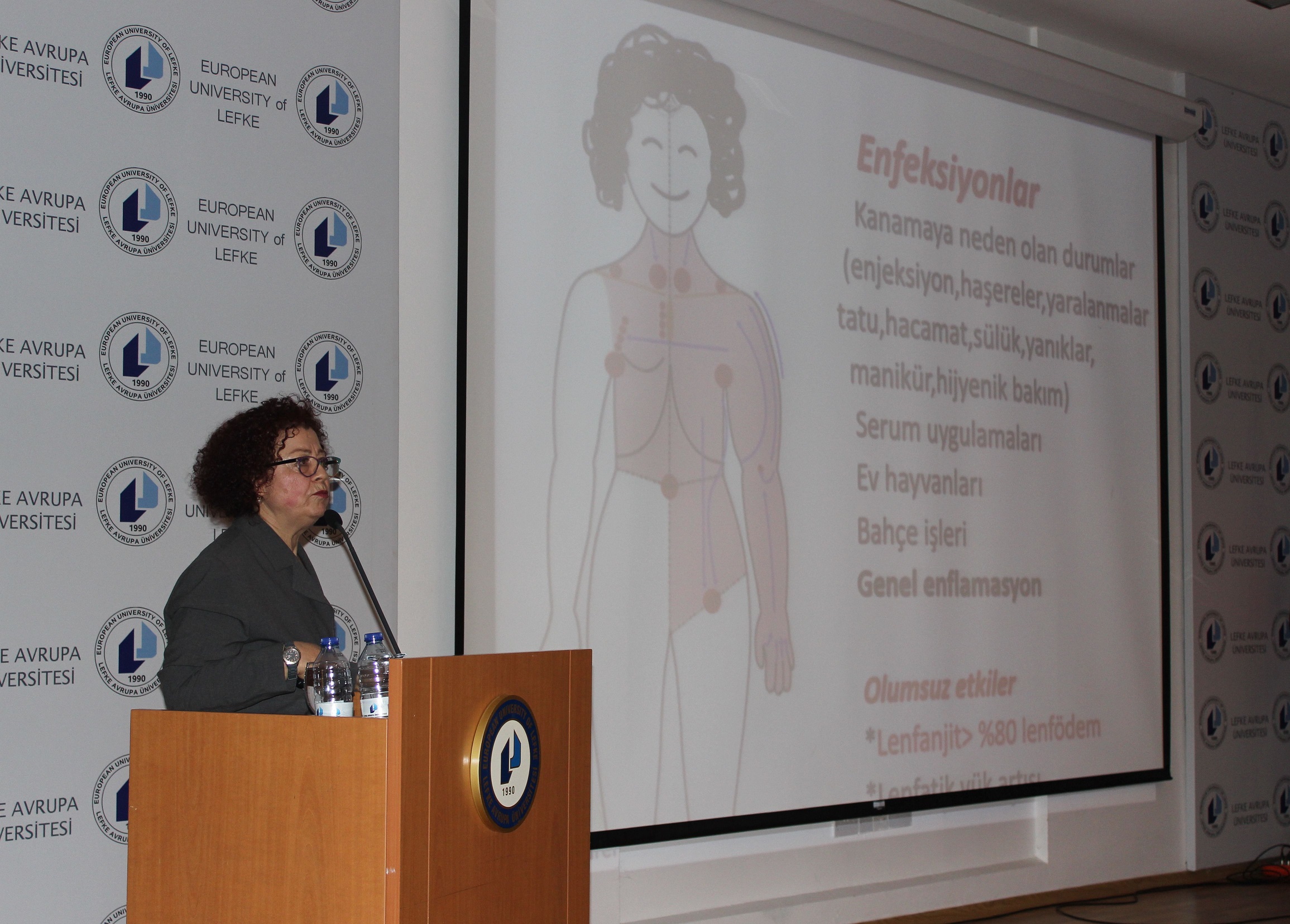A conference on “”Living and Managing the Breast Cancer and Lymphedema” was held in EUL

“Conscious education, conscious patient and quality life”
European University of Lefke (EUL) Physical Therapy and Rehabilitation Club held a conference on “Living and Managing the Breast Cancer and Lymphedema”.
After Vice President of the Physical Therapy and Rehabilitation Club Barış Keçeci giving information about the physiotherapist’s field and the physiotherapist’s identity, Mr. Osman Okan Kayan, a member of the club, gave a brief talk on March 8, World Women’s Day, at the conference held at the Rauf Raif Denktaş Educational Complex Conference Hall, EUL. After the opening speeches, the poetry and music concert presented by the Physical Therapy and Rehabilitation Club students took place.
Gürel: Patient education in lymphoma is extremely important
Expert Physiotherapist Gülsün Gürel made a presentation on “Breast Cancer and Lymphedema” and stated that the rehabilitation of patients with breast cancer is continuing with vague and inadequate therapy forms until very recently. Gürel said that attempts at techniques that affect the shoulder-arm complex, such as total mastectomy, lumpectomy, axillary lymph node dissections, chemotherapy and especially radiotherapy, have caused some mechanical disorders in this region, such as inhibition of lymphatic flow, muscle wasting loss, hardness and stickiness of soft tissues, and joint limitations. Gürel said that the main problem facing these patients and affecting life negatively is lymphedema. Gurel stated that patients who had to take one or more of the combination therapy programs out of the list above had to deal with various complications and difficulties because they were left alone when the treatment was over, were not warned about lymphedema, and had not received training from the lymphedema physiotherapist. Gürel noted that this situation requires an adequate physiotherapy approach to return to the patient’s physical equipment as soon as possible and repair any possible loss. Gürel emphasized that “patient education” is very important for solving these problems; such as to learn about what exactly causes lymphedema, nutrition, sports activities, physical competence, career and occupation planning, what scientific merit depends on it, and how to manage edema and life.
Gürel: The most effective treatment of lymphedema physiotherapy for today is Complex Excretion Treatment
Gürel said that the rehabilitation of patients with breast cancer and lymphedema requires a team to work and that dynamic communication between physician, operator, oncologist, radiologist and lymphedema physician is very necessary in terms of patient treatment and quality of life, afterwards. Both surgical techniques, oncologic approaches, treatment times, medications used, doses administered on radiotherapy, and therapy times have changed from patients to patients. Gurel explained that in these cases, Lymphedema physiotherapists should closely follow their patients in these processes for a possible risk of edema, indicating that patients who are generally on chemotherapy treatment are at the end of their treatment and that their exposure to lymphedema is particularly common, especially in patients receiving radiotherapy.
Gürel stated that studies on protocols and approaches related to lymphedema treatment are yet to be clarified, and that the biggest goal of physiotherapy is to prevent the early development of ophthalmology. From this point of view, the prevalence of protective physiotherapy is quite high. Gürel said that if the patient is eligible, training in lymphedema and physiotherapy prior to surgery should be initiated and awareness and repair studies should be initiated for rehabilitation of affected shoulder joint and proper posture recovery after surgery.
Pointing out that the most effective treatment of Lymphedema Physiotherapy is Complex Excretion Therapy and that this treatment is done by trained and certified physiotherapists, Gürel stated that this treatment includes excretion, exercise, pressure dressing and bandage and patient education with special techniques. Gürel stated that the number of physiotherapists working with lymphedema are increasing day by day and thus facilitating the awareness of patients and professionals. “This development makes me happy as a person who developed lymphedema after breast cancer in 2000. As a patient and a physiotherapist who had to go abroad because of the lack of lymphedema treatment in our country in those years, I would like to extend my gratitude to all institutions and organizations that organized such an enlightenment work. ”
At the end of Gürel’s presentation, she was presented with certificate appreciation by the Dean of EUL Faculty of Health Sciences Prof. Dr. Ruhi Selçuk Tabak.
